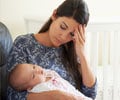More than 30 risk factors have been identified during and after pregnancy for children developing psychosis, reveals a new study.

‘More than 30 risk factors have been identified during and after pregnancy for the development of psychotic disorders in offspring.’
Read More..




These prenatal and perinatal environmental risks, meaning risks during pregnancy and seven days after birth, have a significant effect on the likelihood of their child developing psychosis. As a result, researchers suggest women at risk should be screened early on in their pregnancy so that those with these identified risks can be given additional support. The findings have been published today (Tuesday 24 March 2020) in Lancet Psychiatry. Read More..
Gathering data from 152 studies published between 1977 and July 2019 and looking at 98 factors, researchers identified 30 significant risk factors and five protective factors.
Psychotic disorders are severe mental illnesses which cause abnormal thoughts, such as hallucinations or delusions, but they can affect each person in different ways. In 2014, a survey found the 6% of people in England said they had experienced at least on symptom of psychosis.
Factors can be split into four categories; parental and familial, pregnancy, labour and delivery, and foetal growth and development. Significant protective factors were mothers being aged between 20 - 29, first time mothers and higher birthweights in babies.
For risk factors, previous mental health conditions in either parents, nutritional deficiencies, low birthweight and giving birth in the colder months were found to increase the probability of a child developing psychosis. Age related risk factors were either parent being under 20, mothers between 30-34 and fathers over 35. Researchers also found that a lack of prenatal care visits poses a risk and marked this as a potential risk factor to combat with outreach campaigns.
Advertisement
This study will help guide future research in the field of psychosis, as well as form the basis for psychosis risk prediction models which could advance preventative strategies.
Advertisement
Whilst this study focused on the environmental factors there may also be genetic or epigenetic risks factors that are implicated in the onset of psychosis.
Source-Eurekalert











